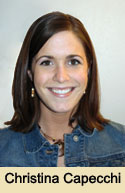Twenty Something / Christina Capecchi
No predicting the master’s plan
 March Madness thrills sports nuts and statisticians alike.
March Madness thrills sports nuts and statisticians alike.
There are 65,000 possible combinations of teams that could make the Final Four, statisticians calculate, which means we can expect our 64,999th guess.
Last March, little-known George Mason University made the Final Four. The black-and-white tale of David vs. Goliath was played out in vivid color on TVs across the country.
March Madness delivers what it promises: The reality that anything can happen and the knowledge that the biggest surprises often occur in the final seconds.
Yet for the sake of tradition and amusement and folly, we brazenly cast predictions. We apply theory to the inexplicable. We watch ESPN’s experts, we listen to radio reviews, we read online guides, we swap notes with friends and we synthesize all the data.
At last, we fill out that bracket in our neatest handwriting, the signature of tightly-wound hope and strategy. Then we watch the tournament unfold, that amorphous mix of skill and drive and momentum and magic.
More than other tournaments, this three-week contest resonates with viewers because it is like life: packed with madness, short on method. In the Big Dance of life, there are buzzer beaters and bracket busters. Trying to accurately predict an outcome in life is as futile as predicting the victor of March Madness.
And yet we try. We can’t help it. It is a human impulse: We want a plan, we want to prepare, we want to know where the heck we are headed.
Young adults feel this most acutely. The blankness of the future and the vastness of possibility frighten because they allow for many missteps.
When I interview people, I’m always intrigued to hear the arc of their lives.
Cindy found romance in a blizzard. Her car quit and she sought refuge at the nearest house, the home of her future husband.
Rich landed his dream job when he sat next to a company president during a train ride. He usually took the 8:10 a.m., but he had been running late that morning.
Chuck daydreamed about an early retirement somewhere sunny. Then his teenage son became a father, and the new grandpa stayed put and beheld an undesirable accident become his greatest blessing.
Life never goes according to plan. Our call as Catholics is to relinquish the comfort of control and to place our trust in God.
St. Francis de Sales, a 16th-century sage, spent considerable ink making this point.
“God’s reasons and judgments are impenetrable,” he wrote, “yet ever sweet, ever gentle, ever useful.”
When life takes unexpected turns, St. Francis wrote, we must focus on our Creator: “Everything may be topsy turvy, not only around us, but within us. But whether we are sad or happy, delighted or disgusted, scorched by the sun or refreshed by the dew, the fine point of our heart, our spirit, which is our compass, must ever tend toward the love of God.”
I love that phrase “topsy turvy.” It makes me picture a basketball rolling around the rim, evoking breathless suspense. Will it go in? Will I land the job? Will I meet my mate? Will I find a home? Will I beat the buzzer?
It’s OK to be an underdog if you’re a person of faith. It’s OK to be sweaty and tired. Because God has crafted a wise and loving master plan—and it always ends in victory.
(Christina Capecchi is a graduate student at Northwestern University in Evanston, Ill.
E-mail her at christinacap@gmail.com.) †
 March Madness thrills sports nuts and statisticians alike.
March Madness thrills sports nuts and statisticians alike.